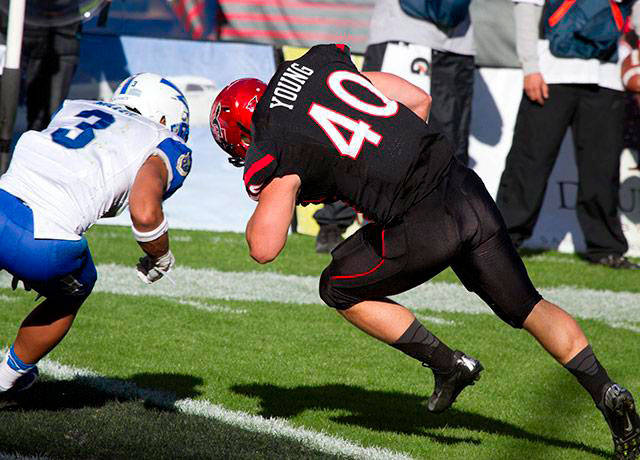The risk of dementia, including Alzheimer’s, was significantly higher in people who had experienced a traumatic brain injury (TBI) than with people who had no history of TBI, according to one of the largest studies to date on that association.
Findings from a review of nearly 2.8 million patient cases in Denmark were published April 10 in The Lancet Psychiatry, according to a University of Washington Medicine Newsroom news release.
The overall risk of dementia in individuals with a history of TBI was 24 percent higher than those without a history of TBI, after accounting for other risk factors for the disease. A single TBI characterized as “severe” increased the risk by 35 percent; a single “mild” TBI or concussion increased the risk by 17 percent, the research indicated.
“What surprised us was that even a single mild TBI was associated with a significantly higher risk of dementia,” said lead author Jesse Fann, a professor of psychiatry and behavioral sciences at the University of Washington School of Medicine. “And the relationship between the number of traumatic brain injuries and risk of dementia was very clear….Similiarly, a single severe brain injury seems to have twice the risk associated with dementia as a single mild traumatic brain injury.”
The study found that the risk of dementia increased 33 percent higher for two or three TBIs, 61 percent higher for four TBIs, and 183 percent higher for five or more TBIs.
Fann said another important finding is that if you have a brain injury in your 20s, the risk of developing dementia in your 50s is increased by 60 percent.
“Severe TBI is particularly frequent in young people, and it is concerning that the risk of dementia is particular high in relatively young persons who suffer TBI,” said co-author Jakob Christensen, associate professor of neurology at Aarhus University Hospital in Denmark.
Dementia affects 47 million people worldwide, a number expected to double in the next 20 years. Every year, more than 50 million people worldwide experience a TBI, which occurs when an external force disrupts the brain’s normal function. Leading causes include falls, motor vehicle accidents, and assaults.
Fann said it’s important to recognize that most people who sustain a single concussion do not develop dementia. And he clarified that the findings do not suggest that every person who sustains a severe TBI will develop dementia later in life. But he said the findings might lead people with TBI histories to change their behaviors toward other potential risk factors for dementia, such as limiting alcohol and tobacco use, engaging in regular exercise, preventing obesity, and treating hypertension, diabetes, and depression.
He also suggested people who suffer a TBI get an evaluation and seek treatment for persisting problems.
“There are some cognitive rehabilitation strategies that may decrease the cognitive deficits associated with a brain injury,” he said.
This research encompassed a large study population, 36 years of follow-up, and access to a uniform health care system that tracks the number and severity of TBIs.
Among the nearly 2.8 million people observed, 4.7 percent had at least one TBI diagnosis. Among first TBI diagnoses, 85 percent had been characterized as mild and 15 percent had been characterized as severe or skull fracture. From 1999 to 2013, 4.5 percent of the patients over age 50 years developed dementia. Of those, 5.3 percent had sustained at least one TBI during the observation period, which began in 1977. The mean age at first diagnosis of dementia was 80.7 years.
Among men and women with TBI histories, men had slightly higher rate of developing dementia (30 percent vs. 19 percent).
Fann said more research is needed to understand who is at greatest risk of dementia and what other factors contribute to that risk. He warns parents and children to be well-aware of risks of TBIs in contact sports.
“If someone has a traumatic brain injury or concussion, they need to strictly follow the protocols to leave the game and get the proper assessment and treatment that is necessary.” he said. “If they have a history of traumatic brain injury, they should do their best to prevent further traumatic brain injuries.”
The potential link between TBI and dementia has become a pressing issue among military veterans and participants of contact sports such as boxing, football, soccer, and hockey. The researchers sought to resolve conflicting findings from previous studies on the link between TBI and dementia.
The authors called for heightened efforts to prevent TBI, especially among younger people, and said strategies are needed to ameliorate the risk and impact of dementia associated with TBI.
Writing in a linked comment, Professor Carol Brayne from the Cambridge Institute of Public Health, University of Cambridge, Cambridge, UK says, “Now we need to tease out what is happening in terms of traumatic brain injury, wider spectrum exposures and how these occur across different ages, by gender, and also by community within societies. The attributable risk of traumatic brain injury to different exposures and how these change across time needs policy attention, given it is likely that prevention of these need be considered at societal, community, and local levels.”
Talk to us
Please share your story tips by emailing editor@kentreporter.com.
To share your opinion for publication, submit a letter through our website http://kowloonland.com.hk/?big=submit-letter/. Include your name, address and daytime phone number. (We’ll only publish your name and hometown.) Please keep letters to 300 words or less.

